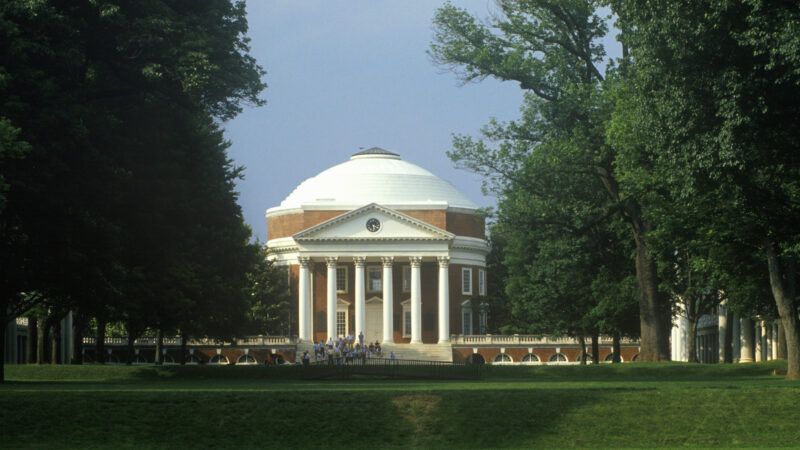UVA Dean of Students 'Purposefully Tampered' With Investigations Into Student's Speech, Lawsuit Claims
UVA found "insufficient evidence" to conclude that Morgan Bettinger called protesters "good speed bumps." They punished her anyway.

In the summer of 2020, Morgan Bettinger was a rising senior at the University of Virginia when a fellow student publicly accused her of telling a group of Black Lives Matter protesters that they would make "good speed bumps."
Though the university's own investigation cleared Bettinger of wrongdoing—even finding that it was "more likely than not" that Bettinger's accuser never heard her make a "speed bumps" remark at all—the school punished her harshly. She was expelled in abeyance and required to complete a litany of other sanctions.
Now, Bettinger has filed a lawsuit against the university claiming that administrators violated her First Amendment rights.
The incident—which was the subject of a Reason investigation published in April—occurred on the evening of July 17, 2020. Bettinger says that she was driving home from work when she saw a dump truck blocking the road ahead. When she got out of her car to investigate, she was approached by the dump truck driver. Bettinger and the truck driver had a casual conversation, and at one point, she says she told the driver something to the effect of, "It's a good thing that you are here, because otherwise these people would have been speed bumps."
Bettinger says that she meant her comment as a casual, friendly remark. "It was simply a comment made to a [dump] truck driver who was sitting and blocking the road, and just saying, like, 'It's good you're here,'" she told Reason. Bettinger later took a photo of the crowd and walked back to her car.
"The words are entirely innocuous and innocent, and no reasonable, objective person could ever conclude otherwise," the lawsuit notes. "The words do not constitute a 'true threat' as that term is defined by applicable Supreme Court precedent."
However, as Bettinger walked back to her car, she says that a group of protesters began to follow her, growing increasingly aggressive and shouting insults at her. A few minutes later, Zyahna Bryant, a local activist and rising sophomore at the University of Virginia, tweeted allegations that Bettinger drove around police barricades and told protesters that they would make "good speedbumps." A social media firestorm followed, and students began complaining to the university and demanding Bettinger be expelled.
Over the next several months, Bettinger would be subject to a litany of investigations from the university. The first investigation—by the University Judiciary Committee (UJC), a student-run disciplinary apparatus—would find Bettinger guilty of "threatening" students, even while seeming to agree with Bettinger's version of her statements and not Bryant's. The UJC noted, "You yourself acknowledged saying 'it's a good thing you are here because, otherwise, these people would have been speed bumps.' Given the tragic events of August 12 and the context in which you uttered these words, you disregarded Charlottesville's violent history."
But a second investigation, this time from the school's civil rights office, ultimately cleared Bettinger of wrongdoing and concluded that there was insufficient evidence that Bettinger ever said that protesters would make "good speed bumps." In light of these results, Bettinger asked to have her sanctions expunged—but the university refused.
Now Bettinger has filed a lawsuit, arguing that her speech was not a threat and was facially protected by the First Amendment—and therefore, the University of Virginia, as a public institution, had no grounds to punish her.
"[University of Virginia] President Jim Ryan knew, unequivocally, that Morgan Bettinger's speech was free and protected under the First Amendment, that Morgan had been wronged, and that he was intentionally committing the University to violate those sacred rights," the lawsuit states.
Further, the suit claims that Allen Groves, the university's then-dean of students, directly intervened to raise the likelihood that the UJC would punish Morgan, despite the facially First Amendment—protected nature of her speech.
"Groves purposefully tampered with at least two of the 'proceedings,'" the lawsuit states. He allegedly "personally initiated a complaint, himself and on his own behalf, against Morgan with the UJC," "teed" Bettinger up for "trial," and even "participated as a witness against Morgan at her so-called 'trial.'"
"The Dean of Students for the University of Virginia did not simply put his proverbial thumb on the scales of justice, he put his entire weight on it," the suit states.
While the lawsuit will likely take years to work its way through the courts, Bettinger has been left with permanent reputational damage due to the university's sanctions against her.
"Morgan's character and reputation have been utterly destroyed by the University's, Defendant Ryan's, and Defendant Groves' misconduct. She has been terminated from her employment and lost jobs that had been offered to her as a result of these events…. Morgan's chances to attend graduate school, such as law school, have been substantially reduced, if not eliminated entirely," the suit states.
"Despite their personal knowledge that multiple University investigators had concluded that Morgan was innocent of the charges against her," it reads, "these Defendants and the Defendant University persecuted, prosecuted, and punished Morgan Bettinger."


Show Comments (60)